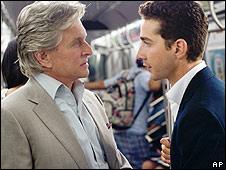US banks 'denied Oliver Stone access'
- Published
Oscar-winning director Oliver Stone has revealed how US banks refused to co-operate with the making of his Wall Street sequel Money Never Sleeps.
Speaking at the Cannes film Festival, he said: "The big banks were very arrogant, they wouldn't let us in."
He added that it was the Royal Bank of Canada that stepped in and allowed them to film inside its buildings.
The movie, which sees Michael Douglas return as Gordon Gekko, is scheduled for release in September.
"It was interesting that they let us in when whereas the Goldmans of this world locked their doors," he added of the Canadian bank's co-operation.
It is no coincidence that Stone decided to make the film as the world has started to recover from one of the biggest financial crises in recent history.
'Story about family'
Douglas approached the film-maker in 2006 about bringing a second movie to life, but Stone did not feel it was the right time as he "didn't want to celebrate that culture of wealth".
It was only once Stone saw another script in 2008 that he started production, as he felt the economic crisis - or as he calls it a "major heart attack and triple by-pass" - could no longer be ignored.

Michael Douglas stars alongside Shia LaBeouf in the film
The film is fast-paced and contains huge figures and financial terminology, allowing the viewer to get a flavour of how a trader feels on a regular basis.
The film begins with 80s bad guy Gekko - who coined the term "greed is good" in the original - getting out of jail and starting to piece his life back together.
A friendship is formed between himself and Jake - a hard working and enthusiastic Wall Street trader played by Shia LaBeouf - who is also engaged to Gekko's estranged daughter Winnie, played by British actress Carey Mulligan.
Although betrayal and greed are common themes that run throughout the film, Stone insists there is something more to this picture.
"This is a story about family," said Stone, who dedicated the first Wall Street to his stockbroker father.
'Dangerous attraction'
"This is a story about people who are balancing their love of power and money with their need for love."
Jake goes into battle against business man Bretton James, played by Josh Brolin, and the harder he tries to win his fight, the more his world begins to crumble around him.
The initial reaction to the film has been positive, with praise for Douglas reprising his role as Gekko.
A special mention must go to Mulligan too, who once again has shown she can do no wrong on screen.
And Charlie Sheen - who also appeared in the original - makes a cameo appearance, drawing the loudest laugh in the theatre.
Although screening such a high profile movie at Cannes will help boost interest and generate more excitement amongst audiences, it did not go unnoticed that it was not included in the Palme d'Or competition.
But Stone showed no sign of disappointment, insisting that taking awards so seriously could become a "dangerous attraction and addiction".
He added: "I think Woody Allen once made the point one time at the Oscars, that it does drive people crazy. We all like competition, but we all sort of compete by making movies."
The film, which had originally been scheduled to be released last month, has now been put back until September.
Stone insisted it was right to delay, despite one journalist suggesting the film might have benefited from coming out during the financial crisis.
"If you keep chasing the news you're never going to be satisfied. The news is going to be there forever," he said.
But he added that he was certain that the problems were far from solved.
"The fourth quarter historically on Wall Street is far more volatile so we will be coming out right into the storm, I think."
Douglas also added that he did not want people to confuse the film with reality.
"I think it is a marketing dilemma, but one should not think that because Wall Street is in the news that that necessarily helps our movie.
"There really has to be a separation, this movie has a lot more things going on about it."